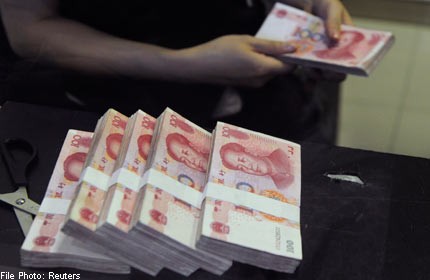S'pore can be yuan clearing hub: Bankers

SINGAPORE - Singapore which recently launched clearing services for China's yuan, should play to its own strengths in developing itself as a clearing hub for the currency, bankers said.
While Hong Kong, the first such centre in the world, has a clear edge due to its first mover advantage and its natural pool of liquidity because of its role in facilitating trade between China and the rest of the world, Singapore has its unique advantages as well, they added.
It will not be easy to erode Hong Kong's head start but the Republic can capitalise on its role as a global trading hub to build liquidity, and its strength as a wealth management centre to help the yuan - or renminbi - business gain ground, said Standard Chartered Bank (China) chief executive officer and executive vice-chairman Lim Cheng Teck.
Regional treasury centres of multinationals and Chinese firms that are based here can also help to build up liquidity, Mr Lim said at a panel discussion held as part of the FutureChina Global Forum 2013 yesterday.
OCBC chief executive Samuel Tsien said: "It is not going to be easy because we don't have a natural supply of renminbi as Hong Kong and Taiwan have. We also have a currency that is relatively strong so the currency play that sometimes applies may not be as attractive."
He added: "Our role in the private sector is to encourage as much flow in South-east Asia from our neighbouring countries to be settled in Singapore (as possible), and this we are doing through our client base through private-sector collaborations."
But the "very well developed" capital and financial markets in Singapore are also its strengths.
"We will also try to... go as much (as we can) into the bond market to serve the institutional market more," he said.
Despite the competition, it is likely that the yuan clearing centres around the world - including Taiwan and London - will evolve naturally differentiated roles based on their location, trade patterns and investment attraction, he said.
Singapore, for instance, could focus on South-east Asia, a major trading bloc with China, and the capital markets, while London might focus on the wholesale institutional market.
This can include mutual funds or insurance firms. Mr Fang Xinghai, director of the Shanghai Municipal Office of Financial Services, also weighed in on Singapore's jostling for a piece of the pie.
Observing that Hong Kong is still one step ahead of Singapore, he said that if the Government thinks of "particular measures" to speed up the development of the centre here, Beijing would be willing to work with it on these efforts.
esthert@sph.com.sg

Get a copy of The Straits Times or go to straitstimes.com for more stories.